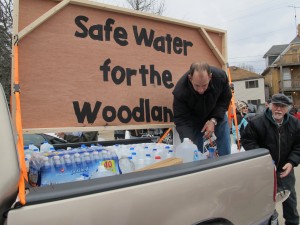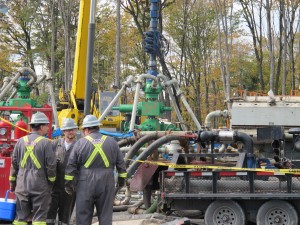Butler County gas leaseholders sue local opponents of zoning change
A dozen western Pennsylvania residents who have leased their land for gas drilling are suing local opponents of gas development in a case that free-speech advocates say could have far-reaching consequences for critics’ ability to debate the industry’s plans.
A suit by the 12 leaseholders and a real estate developer in Middlesex and Adams Townships, Butler County, claims that opponents of a plan to sharply increase the amount of township land that can be used for gas drilling are interfering with the plaintiffs’ contractual rights and depriving them of income from gas royalties.
The suit also accuses two environmental groups and five township residents of making false public statements in their efforts to halt the construction of a gas well pad by R.E. Gas Development, a unit of State College-based Rex Energy, less than a mile from a school.
The defendants last year filed their own legal challenge to a new zoning ordinance that opens about 90 percent of township land for gas development and other industrial uses, some three times the previous area. The challenge was rejected without explanation by the township’s Zoning Hearing Board on May 27, and is now being appealed to the Butler County Court of Common Pleas.
In the leaseholders’ suit, filed in mid-May, they argue that the critics intentionally misstated facts on the health effects of gas development, and conducted a “scorched earth campaign with regard to dissemination of false, misleading and inflammatory statements.”
They also accuse opponents of delaying the permitting and construction of the well site, using tactics including “frivolous” substantive challenges to the ordinance and zoning permits.

Susan Phillips / StateImpact Pennsylvania
A man helps deliver donations of clean water to residents of Butler County who say gas drilling polluted their water supply, February, 2013.
“Defendants’ activities and actions have caused companies to stop, suspend, or not proceed with activities, drilling and production, resulting in a loss of substantial income to plaintiffs,” the suit says.
It accuses the defendants of “tortious interference” with current and prospective contracts, as well as civil conspiracy, and seeks damages of at least $35,000 per defendant plus punitive and other penalties, totaling “in excess of hundreds of thousands of dollars.”
Richard Sandow, an attorney for the plaintiffs, said leaseholders are losing significant sums of money as a result of the delay in gas drilling caused by the opponents’ campaign, and so are seeking to prevent further disruption.
A free-speech campaigner said the suit represents an effort to chill public debate, and is an attempted violation of the U.S. Constitution’s First Amendment.
Vic Walczak, Legal Director of the American Civil Liberties Union of Pennsylvania, said the suit appears to be a “SLAPP” action, a legal acronym standing for Strategic Lawsuit Against Public Participation, that he said is sometimes used by real-estate developers against local opponents.
Such suits are typically without legal merit, Walczak said, and so are often thrown out by the courts but their filing alone goes some way to achieving their goals because they subject defendants to an expensive, time-consuming, and stressful experience that may persuade them to withdraw their opposition to the project in question while deterring others from joining a protest.
“The Middlesex leaseholders’ suit falls squarely into the SLAPP category by trying to silence critics and by making inaccurate claims about the defendants,” Walczak said. He argued that its accusations of false and misleading claims by the defendants are not backed up with any specifics, and so are in themselves false.
“The defendants have delayed drilling but have not done anything illegal,” he said. “The only thing they have done is to use established government procedures to air their grievances.”
Walczak said the ACLU is considering getting involved in the case because of its implications for free speech in other locations, whether or not they involve gas drilling.
“This seems to be a classic SLAPP suit, which makes it really dangerous and important,” he said. “If there’s no vigorous challenge, that’s going to encourage others to try the same tactic.”
Patrick Creighton, a spokesman for R.E. Gas Development, which signed leases with 11 of the plaintiffs, said the company has nothing to do with the lawsuit, and will resume its construction of the Geyer well pad in Middlesex Township following the Zoning Board’s rejection of the opponents’ challenge.
By the end of June, the company plans to retest groundwater, construct sound-abatement walls around the site, and install “conductor casing”, the first of four layers of steel casing that is inserted into the ground to house the well bore, Creighton said. He declined to say when drilling would begin.
“As activities restart, we will also resume our previous practice of providing operational updates to the Mars Area School District, local elected officials, and emergency management personnel,” the company said in a statement.
The other gas companies who signed leases with the plaintiffs are Range Resources, a leading driller in southwest Pennsylvania’s portion of the Marcellus Shale, and Dale Property Services, an oil & gas leasing company based in Canonsburg.
Amy Nassif, an Adams Township resident who is a defendant in the leaseholders’ suit, dismissed the leaseholders’ claim that her opposition to the well pad contributed to their loss of income.
“It is outrageous to think that I am personally responsible for any type of agreement that a landowner has with any company,” she wrote in an email. “The leases that people sign are not my concern and never have been.”
“My primary concern and the discussions that I have had at the local and state level are about my children and the over 3,200 children in our school district in regards to their health and safety,” said Nassif, whose children attend the school.
Nassif argued that the suit infringes on her free-speech rights. “It is clear that my rights under the First Amendment to express my opinions, both for and against contentious issues, are at risk,” she said.
Nassif and other drilling opponents said in their complaint against the township’s zoning changes that supervisors ignored the traditional division between industrial and residential land, and did not allow public hearings for residents who might object to the ordinance.
County records show that all three township supervisors and all four members of the Zoning Board signed gas leases between 2008 and 2014.
Members of the zoning board did not return a phone call seeking comment.
Aaron Jacobs-Smith, managing attorney for the Clean Air Council, another defendant in the leaseholders’ suit, accused the plaintiffs of trying to shut down debate on gas drilling in their own community and elsewhere in Pennsylvania.
“We have been working with residents in a community whose chief concern is to keep industrial activity at a safe distance from where their children go to school,” he said. “And Mars is not the only community with this concern.
“The lawsuit bought against us, DRN and the local residents has the potential to have a dangerous chilling effect on a form of speech directed at protecting children.”
Jacobs-Smith said there is also ongoing litigation in Allegheny, Pulaski and Robinson Townships over what he called “overly permissive zoning.”
This story has been corrected to reflect the fact that Amy Nassif is not a plaintiff in the legal challenge against Middlesex Township.

















